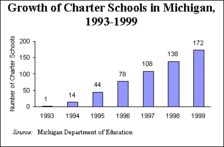
In 1993, when Governor John Engler signed Michigan's charter-school law, Dr. Jeremy Hughes, superintendent of the Dearborn City School District, decided he wasn't going to wait to see whether his district would begin losing students to charters. "When the ink was barely dry on the charter-school legislation," Hughes says, he got his team together and came up with an idea that could compete with charter schools for students: "Theme Schools and Academies."
In the next few years, Dearborn City Schools adopted its own curricular themes such as character education, creative arts, engineering technology, extended school year, multi-age classes, gifted and talented, history, and others. Parents could choose the curricular theme that suited them so that they wouldn't go looking for the same emphasis outside the district's schools.
Did it work? Hughes believes it did. Today, despite competition from four nearby charter schools, other charters in the adjoining Melvindale and Detroit districts and "schools-of-choice" in the adjoining Dearborn Heights district, Dearborn City Schools has increased enrollment. The latest figures available show a rise from 14,229 students in 1994-95 to 16,263 in 1998-99. "We welcome competition," says Hughes. "The reforms we've enacted would not have happened, at least not as fast, without competition."
Today, over 170 charter schools are competing with traditional public schools in Michigan, serving more than 50,000 students across the state, and "schools-of-choice" are enjoying limited success. Have Michigan's charter-school law (passed in 1993) and its "schools-of-choice" legislation (passed in 1996) lit a fire under traditional public schools that decades of tougher standards and greater resources couldn't? Recent research affirms what the Dearborn experience suggests.
A Western Michigan University study conducted in January 1999 states that "the greatest impact of the [charter schools] is that they are forcing more accountability upon the traditional public schools." The study reports that many metro Detroit school districts are offering new programs such as all-day kindergarten and before- and after-school programs. Many districts have stepped up efforts to involve parents and have placed greater emphasis on foreign languages and state achievement test results.
Another report, sponsored by the Michigan Department of Education last year, admits that charters are spurring traditional public schools to offer more innovative programs and be more responsive to parents and students. And in October 1999, a team of Michigan State University (MSU) researchers recommended expanding the charter-school program because it had forced traditional public schools to be more responsive to parents. As Gary Sykes, one of the researchers, stated, "The debate over whether to have more choice in the public schools in this country is essentially over. The positive parts of choice are just too powerful."
These changes are occurring despite severe limits on competition. Currently, only schools that wish to do so need participate in the "schools-of-choice" program. And Governor Engler's efforts to remove the "cap" on the number of charter schools have so far failed. Competition has yet to truly affect the vast majority of Michigan students the way it would under a more widely applied school-choice program. But competition, even within these restrictions, is starting to change the incentive structure of education in Michigan.
In Inkster, the school board has contracted with a private firm to manage its schools and improve the curriculum. In Dearborn Heights, where enrollment was dropping prior to 1996, the "schools-of-choice" program allowed the district to attract more students and avert a financial crisis. And in Holly, school leaders and parents recently reached consensus on what to do about the loss of 113 students and a $767,000 budget deficit: The district must compete with charter schools and schools-of-choice by offering a better program and aggressively recruiting students.
As a forthcoming Mackinac Center for Public Policy report on the effects of school competition in Wayne County states, "Making parents happy isn't just good public relations anymore. It means prosperity and survival."
Competition is creating an atmosphere in which solutions unheard-of a decade ago can be tried. It's prompting administrators and teachers to think of new ways to better serve their customers. Michigan children are the prime beneficiaries, and isn't that what education is really about?
Ultimately, changing incentives through competition promises more progress in schools than has been accomplished by decades of tougher standards, more books, more teachers, and more money.
(Dr. Matthew Ladner is president of Capitol Research and Consulting in Austin, Texas, and co-author of a forthcoming Mackinac Center for Public Policy report on competition in education. More on education reform can be found at www.mackinac.org. Permission to reprint in whole or in part is hereby granted, provided the author and his affiliations are cited.)

The Mackinac Center for Public Policy is a nonprofit research and educational institute that advances the principles of free markets and limited government. Through our research and education programs, we challenge government overreach and advocate for a free-market approach to public policy that frees people to realize their potential and dreams.
Please consider contributing to our work to advance a freer and more prosperous state.